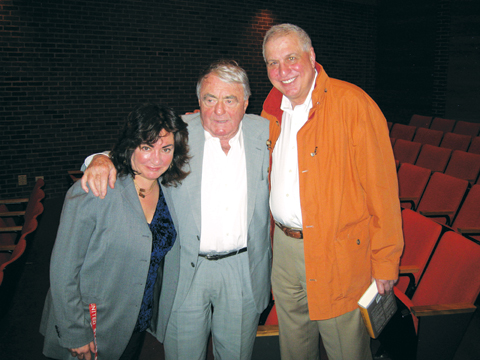
WHEN ERROL MET CLAUDE Legendary nonfiction filmmakers Morris (right) and Lanzmann, shown here with Brandeis professor Alice Kelikian, discussed the vicissitudes of historicity. |
Last Friday, Brandeis University brought together two legends of nonfiction filmmaking: Errol Morris and Claude Lanzmann, the latter of whom was in town to show his new film, The Karski Report. At the Edie and Lew Wasserman Cinematheque, the two filmmakers shared the stage with a lectern displaying the motto "Truth even unto its innermost parts." Morris, who bores deeply into his interview subjects (e.g., Robert McNamara for The Fog of War), asked Lanzmann about the relationship between the past and the present in his nine-and-a-half-hour, 12-years-in-the-making, landmark Holocaust film, Shoah (1985). The film is made up of testimonies by survivors, perpetrators, and Polish bystanders, without archival footage or scholarly narration.
Unfortunately, the 86-year-old French filmmaker — whose autobiography, The Patagonian Hare (Farrar, Straus, and Giroux), has just come out in an English translation — was suffering from pneumonia, which slowed the tempo of the discussion. Morris stressed that Shoah is more than mere oral history, that it has been an artistically influential work. Lanzmann, for that matter, resists calling Shoah a documentary, but rather looks at it as an "incarnation," for which he had to stage scenes. For example, when a Jewish survivor is brought back to the site of a death camp in Poland, and sings a German song the Nazis forced him to sing as a boy, this event, said Lanzmann, "is pure creation, this did not exist before."
The filmmakers agreed that gesture can be more powerful than words. Lanzmann related how, when a Polish train driver specified that he didn't pull the cars full of Jews to the camp, he pushed them, and then made a pushing motion with his hands, the gesture constituted a "moment of illumination."
As the men concurred in their dislike for the 1955 film Night and Fog, Lanzmann added that Alain Resnais's film "is an idealistic work. Shoah is not idealistic. In Shoah, there is not a single corpse. It is a film about an extermination camp. The people were killed and burned, the bones put in bags and thrown in a river, no trace. The very absence of corpses is the absolute proof."
"People want simple morals from history," Morris responded. "There are none."
"This is the reason why there is not one single American dollar in this film," said Lanzmann. "People asked, 'What is your message, sir?' I have no message. If I said, 'We should love each other,' probably I would have gotten some money."